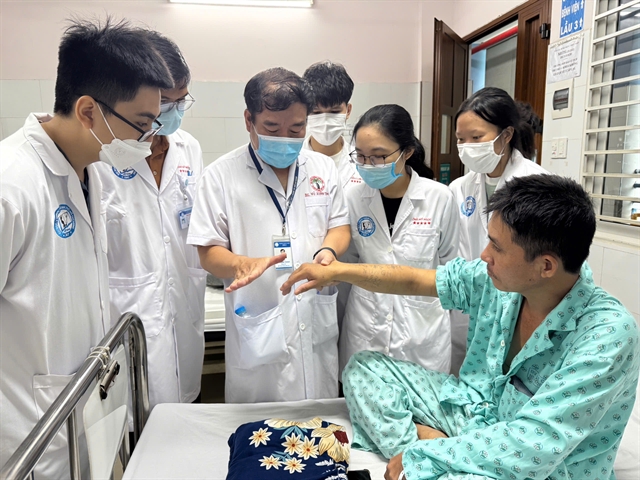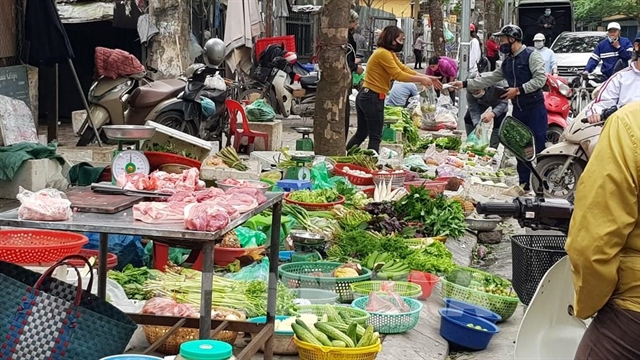 Opinion
Opinion


|
| A wet market in Hà Nội. — VNA/VNS Photo |
By Chi Nguyen, Silvia Alonso, Fred Unger and Hung Nguyen of the International Livestock Research Institute.
The world is celebrating today World Food Safety Day (June 7) that was initiated by the World Health Organization in 2019 and is marked annually. The theme of this year is ‘Food safety, everyone’s business’ – as food safety touches every person in the world, regardless of age, gender, social class or place of origin.
In Việt Nam, food safety has been attracting a lot of attention in recent years as people have seen growing food safety concerns. Development is accompanied by urbanisation, rapid increases in demand for food and, consequently, rapid changes in supply chains, which become longer, more complex, and less transparent. The key challenges of food safety include consumer mistrust, food scandals and miscommunication which threatens the lives of millions of fragile producers and traders who are mainly the poor.
The impressive growth of Việt Nam's economy has created an emerging middle class who favour a Western lifestyle. They like shopping in modern shopping malls, buying foods from retail outlets and convenience stores. This has led to the recent boom of modern retailers with many big players. The emergence of retail tycoons creates unprecedented fierce competition with traditional markets that still provide food for more than 90 per cent of people. Does the flashy appearance of retail tycoons and modern supermarkets ensure the food they provide daily is safer than fresh food provided in traditional wet markets?
There is belief that traditional wet markets sell unsafe food and that safe food can only be found in modern, good infrastructure-based supply chains. This myth, going along with the COVID-19 pandemic, sparked a boycott of traditional wet markets around the world, including in Việt Nam.
At the same time, there is a counter argument that traditional markets and supermarkets are both legitimate, and that while they face different food safety challenges, both are essential to meeting the nutritional needs of the citizens of low-income countries. In Việt Nam, people come to the supermarket to buy canned food and also to enjoy the cool air conditioner and a luxurious life that they could hardly see some 10 years ago. But, they maintain the habit of buying fresh food from traditional markets in the early morning or late afternoon after work because of their convenience and affordability. Indeed, chains can be complementary rather than competitive.
Our research from International Livestock Research Institute (ILRI) and its partners on pork safety in Việt Nam shows that generally pork from both traditional and supermarket was contaminated with Salmonella – a bacteria that can make people sick if Salmonella contaminated food is not well cooked or it cross-contaminates other food. Research also indicates that pork from supermarkets did not necessarily have less microbial contamination than pork sold from traditional markets. This might sound strange to people, but it is true that traditional markets can mitigate risks of contamination through rapid sales, small volumes, and ability to build good relations between vendors and customers. In the case of meat, it takes only a few hours from slaughtering to retailing, reducing its exposure to contamination. On the contrary, it is possible that in supermarkets, the meat is often kept for several days, facilitating contamination and bacterial growth, especially where electricity supply is unreliable.
As such, to move forward with no one left behind, it is necessary to support traditional markets through capacity development and incentivise their investment in food safety, specifically through credit support packages and training on food hygiene and food safety. The ideal scenario is that these markets are strongly embedded into the country’s legal framework and enforcement in these markets is strengthened to bring gains to national food security, public health and prosperity for the significant portion of people who trade in traditional markets.
More information on ILRI and its partners’ research on food safety can be found on the ILRI landing page exclusively prepared to celebrate the World Food Safety Day 2020: https://www.ilri.org/world-food-safety-day-2020




